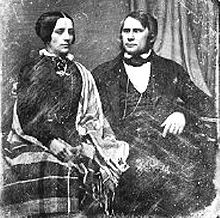Hermann Duncker (politician)
Hermann Carl Rudolf Duncker (born January 5, 1817 , † December 13, 1893 in Berlin ) was a Berlin mayor and Prussian member of parliament.
Life
Duncker was the son of the publisher Carl Friedrich Wilhelm Duncker . The brother Maximilian Duncker was a history professor in Halle and from 1867 to 1874 director of the Prussian state archives. Two other brothers worked in the family's publishing house. Another brother was an officer and a military writer.
Duncker studied law and political science in Berlin . Friedrich Carl von Savigny and Eduard Gans had a great influence on him . After the first state examination, he first worked at the Berlin City Court from 1837. After the trainee examination, he went to the Higher Regional Court in Arnsberg in 1839 . A short time later he returned to Berlin as an assessor at the Supreme Court and had been special commissioner in Belzig since 1843 . A short time later he moved to the Poznan District Government . There he was, among other things, legal advisor of the school council and the consistory.
In 1846, Duncker joined the city of Berlin as a paid city councilor. Together with others he stood for more liberal political approaches. In March 1848 he laid down various requests for local political reform in a memorandum. However, the majority of the magistrate refused to send it to the king. A short time later, Duncker was part of the delegation that asked Friedrich Wilhelm IV to withdraw the troops from the city.
Duncker belonged to the Prussian National Assembly and sat there in the center. Between 1859 and 1861 he was a member of the Prussian House of Representatives in the old liberal Vincke faction .
In 1860 he was appointed syndic of the city of Berlin. From 1861 to 1864 Duncker served as chairman of the poor and then from 1864 to 1872 as head of the debt deputation. From 1872 he was mayor of Berlin with the title of a secret councilor. This made him the second man in the magistrate and deputy mayor . During the vacancy between Arthur Hobrecht and Max von Forckenbeck , Duncker served as mayor for six months in 1878.
A street in Prenzlauer Berg is named after him.
literature
- Adolph Kohut : From the life of Hermann Duncker, retired mayor. D. of Berlin . In: The Bear. Illustrated weekly for patriotic history , Berlin, March 12, 1892, XVIII. Vol., No. 24, p. 284.
- Marlies Ebert: City Councilor, Syndic and Mayor . In: Berlin monthly magazine ( Luisenstädtischer Bildungsverein ) . Issue 072, 2001, ISSN 0944-5560 , p. 85-92 ( luise-berlin.de ).
Web links
- Short biography. Berlin State Library
| personal data | |
|---|---|
| SURNAME | Duncker, Hermann |
| ALTERNATIVE NAMES | Duncker, Hermann Carl Rudolf |
| BRIEF DESCRIPTION | Local politician (Berlin) |
| DATE OF BIRTH | January 5, 1817 |
| DATE OF DEATH | December 13, 1893 |
| Place of death | Berlin |
